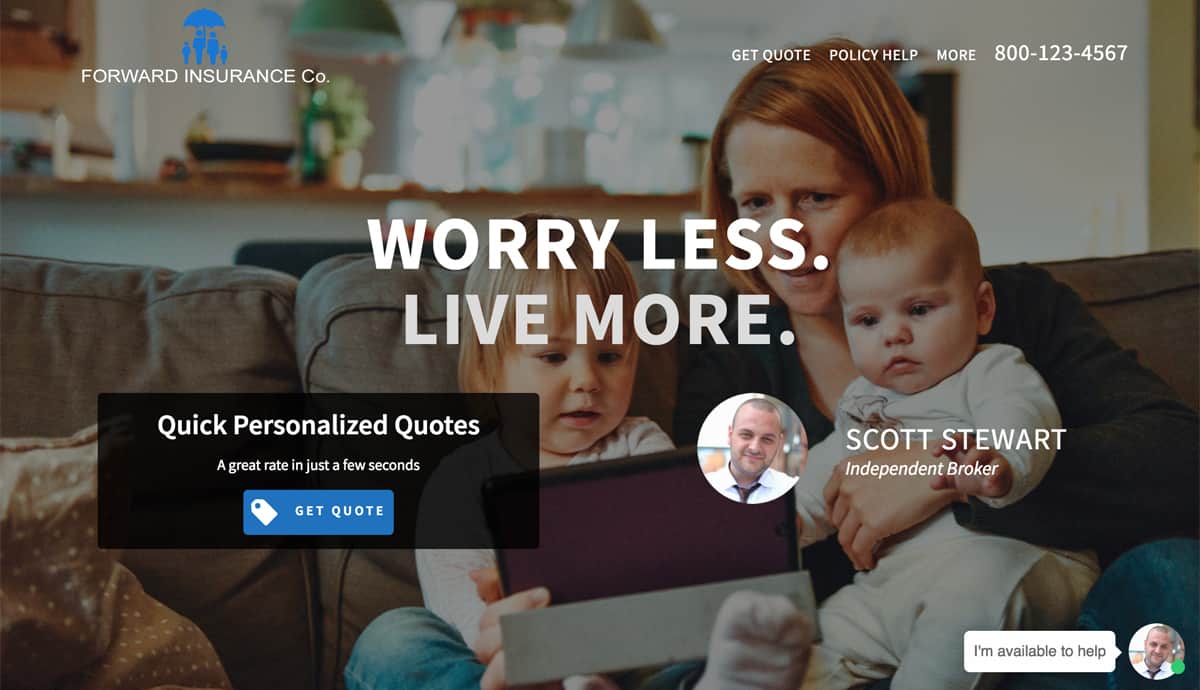We hear about climate change a lot these days and for good reason. Disasters are already sweeping the planet, causing around $150 billion per year in damage just in the U.S. With climate change increasing the rate of these disasters, the clean-up bill is only going to get worse.
Fortunately, however, insurance agencies can play a unique role in improving climate outcomes while saving other businesses money and growing their own capital.
The connection between climate change mitigation and insurance is a worthwhile relationship to explore. Not only can it help you build value in your insurance agency but it can help make a real difference when it comes to sustainable business practices.
Climate change is impacting nearly every facet of life, and as a result, insurance companies are responding to this impact. For example home insurance companies are increasing premiums on houses that are in areas where wildfires and hurricanes are occurring with more intensity and frequency. Also, health insurance companies are expecting to see a rise in cases of contagious diseases that are released from melting ice caps.
With a cleaner future in mind, consider these strategies for tackling climate change through your insurance agency.
Table of Contents
Explore Your Options for Providing Climate Insurance
Climate change is one of the many factors affecting the future of insurance. As insurance companies adapt to a new world of risks, opportunities, and business policies, they need to keep in mind the challenges climate change creates for clients.
For example, the Pacific Northwest faces risks posed by wildfire while the southeast is wracked by hurricanes. To provide the protective insurance products clients in these areas need, insurance agencies must increase their inventory of products.
Clients will need highly flexible and customizable plans to fit the challenges of their particular area. This means insurance agencies will have to reevaluate their budgets and strategies as they explore what it means to offer new coverage.
For every potential disaster, there are varying rates of risk and damage associated. Additionally, products will have to be balanced to produce an effective rate of revenue. You don’t want to be paying out more money than you’re taking in.
To effectively develop a suite of products that protect your customers against climate change, you’ll need to assess all types of insurance and how much it will cost you to bundle and sell them. Then, research and implementation will undoubtedly impact your budget.
Tackling climate change through an insurance agency is a complicated but worthwhile process. Planning will be a key element to any success you experience along the way.
As you explore all your potential options for providing climate insurance coverage, conducting risk assessments will be absolutely vital.
Conduct Risk Assessments
Risk assessments are one of the most important tools at any insurance agent’s disposal. With the ability to gauge the potential for disaster and hedge finances against them, you can build a successful agency even amid increasing climate disasters.
But conducting risk assessments requires complete thoroughness. It’s best to be prepared for eventualities that may never come about rather than be taken by surprise when a disaster strikes. With a comprehensive approach to risk assessments, you’ll understand the true impact of climate change and the importance of fighting it.
All kinds of risks are making themselves known to the scientists and doctors studying the effects of climate change. Now, it’s understood that climate change even plays a role in increasing our exposure to diseases and contagious viruses, some of which are waiting in the rapidly-thawing Arctic ice.
As the environment continues to change due to the altered composition of our atmosphere, these climate and global health risks cause massive challenges to businesses. All one has to do to understand why global health is so important is to look at the economic and social effects the COVID-19 pandemic has had on the world. Before COVID, diseases like HIV and influenza had their turns devastating society.
But insurance companies can help protect companies and individuals against these risks. Carefully crafted insurance plans based on thorough risk assessments lead to reasonable insurance premiums for comprehensive protection.
With climate change heating up, insurance agencies can provide greater value to their clients by bringing with them a total understanding of risk amidst environmental uncertainty.
Be Transparent About Climate Change Causing Higher Rates
Naturally, insurance agencies will have to increase their rates as they build in new product offerings and coverage options. Increased risk demands higher premiums because the likelihood of payout goes up. Climate change makes all kinds of trouble more likely.
Though climate change isn’t directly to blame for every natural disaster, it is anticipated to play a much larger role in the likelihood of natural disasters in the near future. These disasters include:
- Drought
- Intense storms
- Tropical cyclones with greater windspeeds
- A wetter Asian monsoon
- Flooding
Climate change is rising not only average temperature values but extreme temperatures, as well. In turn, the likelihood of weather-related disasters goes up all over the world.
And with natural disaster comes death, grief, and trauma. The majority of American adults have experienced at least one traumatic event in their lifetimes, and the experience often creates mental health struggles for the survivors. Receiving care in these instances isn’t always cheap.
For insurance companies, this means more money is paid out. Your premiums will have to rise as a result, and your customers deserve to be told why.
Be open and transparent with your customers every time rates need to rise due to any effect of climate change. Explain how climate change causes chain reactions that become extremely expensive.
From here, you can begin to build greater community awareness about the importance of tackling climate change. You’ll also be prepared to offer incentives for climate-safe behaviors.
Offer Insurance Discounts for Safe Climate Behaviors
Insurance agencies can play a unique role in changing business behaviors across industries to support a cleaner climate. This is possible through all the discounts and incentives insurance providers can offer to encourage better practices.
We are seeing many insurance companies make use of these incentives already. For example, Travelers’ Insurance has a program that pays customers up to 10% of their replacement costs if they choose to rebuild aspects of their home with green materials.
Additionally, other providers of home insurance are offering green home discounts for taking advantage of certain clean practices. These typically entail money off for opting into paperless statements or discounts for getting a home LEED certified.
While simple, such incentives set the standard for getting consumers interested in green practices. This acts to establish a zeitgeist of greater awareness while showing the public that there is value in sustainability.
As these provisions create new opportunities, insurance agencies can explore additional products and discount programs that elevate business sustainability practices. In agriculture, for instance, cover crops have been proven to boost soil health and productivity while reducing water use and herbicide costs. Ultimately, using cover crops makes for a greener environment, which is why the state of Iowa is supporting this practice with a discount program.
Through a partnership between state and federal governments, Iowa developed the “Good Farmer” discount. This gives farmers back $5 per acre where cover crops have been implemented. The idea is that by reimbursing businesses for sustainable practices, the whole community stands to benefit.
Insurance agencies can emulate programs like these at a reasonable scale to encourage better business. This has the dual benefits of attracting customers because of your commitment to sustainable practices and drawing in business from your competitors by providing more value to customers.
With widespread insurance incentives for good business, the standard will pivot to a more sustainable model.
Revise Your Investment Strategies
But it isn’t quite enough to focus on sustainability only where it pertains to client actions. To truly prove your commitment to tackling climate change, you’ll need to revise your investment strategies to support more green businesses.
Every business has its portfolio of invested revenues and other value-building growth strategies. For many, these investments involve oil or oil-adjacent businesses that maintain to some extent the status quo of relying on non-renewable fossil fuels.
Your insurance agency can redress this situation by first divesting from fossil fuels, then reallocating your portfolio to support a sustainable industry. With your investments tied up in innovative tech and clean growth, you’ll be better positioned to thrive in the future.
Revising your investment strategies is a key method for building resilience in your insurance agency. As climate change continues to increase the likelihood of disaster, businesses will have to begin a transition towards more sustainable practices. Being at the forefront of this transition ensures your business isn’t brought down by others that fail due to a lack of sustainable implementation.
When green practices become highly regulated and enforced—which is likely if trends continue in the direction they are progressing—it will best serve insurance agencies to already be fully invested in a cleaner world. From this position, we can better support clean business across the myriad industries that need insurance.
Tackling Climate Change with Insurance
Insurance may seem a strange tool to wield in the fight against climate change. The reality, however, is that with the right insurance policies, we can better innovate and incentivize a more sustainable world.
Insurance agencies have limitless potential to evaluate new products and rebalance their offerings. These days, grants and subsidies are available to help you invest in green policies, while social media tools give you the ability to gauge public opinion and generate leads.
Follow these tips and tricks for evaluating sustainable policies and incentives for your own practice. With carefully cultivated strategies, insurance can help the world make the best choices when it comes to sustainability.






